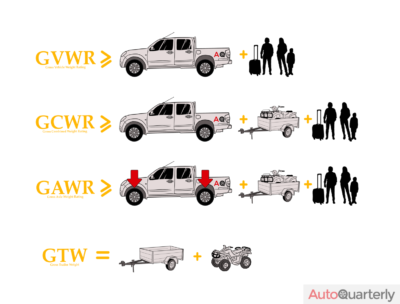A common term that’s thrown around in the automotive world is GVWR. If you’ve seen this term, and are a bit unsure as to what it means, we’ll be answering all of your questions. In the world of automotive terminology, we understand how some phrases can be a bit confusing at times.
We’ll be showing you everything you need to know about GVWR, and we’ll even show you how it applies to vehicles that you may be operating. So if you’re curious about what the term stands for, or how it applies to the vehicle you have, you’re definitely in the right place.
What Does GVWR Stand For?
The term GVWR stands for Gross Vehicle Weight Rating. The term itself refers to how much weight your vehicle can actually handle. This will include things like the amount of passengers your car can carry, the fluid capacity, and any other weight limits that may apply to your vehicle (excluding towing).
Also, the number is used to make sure components don’t have excessive wear. These components include, but are not limited to:
- Chassis
- Engine
- Suspension
- Brakes
- Drivetrain
- Transmission
So the term GVWR is essentially the maximum amount of weight that your vehicle can handle on any given day. If you want to make sure that your vehicle operates properly, you’ll definitely want to read up on the maximum capacity for your vehicle.
What Does GVWR Not include?
You’ve probably noticed that we haven’t touched on towing or trailers yet, and this is due to the fact that GVWR excludes items like this. If you’re looking for that rating, you would need to consult your vehicle’s GCWR rating, but that’s a topic for another article. That rating, in a nutshell, is used to focus on the towing and trailer capacity of your vehicle.
Where Can I Find My Vehicle’s GVWR Information?
Now that you know that the term is, and what it means, chances are you’ll want to locate this information. Here’s how:
The Driver’s Door
There is usually a little sticker that is attached to your driver’s door. The exact location of this sticker will vary depending on the make and model, but it’s almost always on the driver’s side.
Now, once you see this sticker, you’ll notice a whole lot of numbers on it. The most common number you’ll find is the VIN number, so we’ll use that number as a point of reference.
If you’re looking at your vehicle’s VIN number, the GVWR will usually be located up and to the right. You’ll see GVWR, and right next to it will be the maximum weight your vehicle can handle. The unit of measurement for that weight is dependent on your location.
On Google
If you’re not near your vehicle, or if something has happened to that sticker, you’re not out of luck. We live in an age where you can pretty much google anything, so you can always pay google a visit for this information.
If you do happen to use google, please be sure to enter the proper parameters:
- Your vehicle’s year
- Your make
- Your model
- Your manufacturer
- The packages you have
You’ll want to get the specifics right, because different packages can add a different GVWR to your car.
Why Is GVWR Important?
Now that we’re all brushed up on what this terms means, and how you can find it on your vehicle, you’re probably wondering why you should care. It’s definitely an important number; let’s take a look at why.
The Brakes
The first thing we want to discuss is your vehicle’s brake system. The GVWR is the limit at which your brakes can perform the way they should.
If you have too much weight in your vehicle, it can hinder your vehicle’s ability to slow down. Also, the additional weight can add extra wear to your brake system as well.
Your Engine
Your vehicle’s engine is like its beating heart. If everything is running smoothly it has no issues, but the added weight can add some serious stress to your vehicle. This can cause the engine components to overwork themselves and wear down.
Your engine is the lifeblood of your vehicle, and the GVWR is in place to make sure that it doesn’t overwork itself.
Suspension
Suspension is important for a wide range of reasons, but the most noticeable one is turning. If you manage to go over the GVWR limit, this can end up inhibiting your vehicle’s ability to turn properly, which can result in an accident.
Your vehicle’s suspension can be worn down if there is too much weight. This can lead to shocks and struts being worn down, and in some cases, axles can become overloaded.
Tires
If you go over the GVWR limit your tires have a much higher chance of blowing out on the road.
This is caused by friction generated by the added weight. This friction can generate quite a bit of heat, which can lead to a blowout when you least expect it.
Final Words
The GVWR number that your vehicle is given is not something to be taken lightly. This is a number that you should be familiar with, this way you never run into any of the issues that we listed above.
We know that the GVWR number may seem confusing, but all it does is tell you how much weight your vehicle can handle. In short, make sure you don’t go over that weight when loading your vehicle.
If you ever feel a bit lost, you can always come back to this post as a guide!



